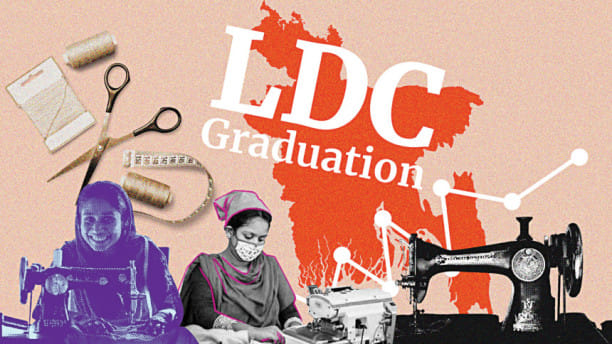Govt to seek post-LDC trade benefits from key partners

Bangladesh will ask its major trade partners, such as its South Asian neighbours, the UK, Canada and Australia, to continue giving it preferential market access after its scheduled graduation from the least developed country (LDC) club in November next year.
Commerce Secretary Mahbubur Rahman said the benefits would be similar to those promised by the European Union (EU), which has already assured Dhaka of duty-free access until 2029.
Amid local exporters urging a delay in graduation and the government holding to its timetable, Rahman said a transition period would help Bangladesh better prepare for what lies ahead.
"We will write letters to the countries concerned soon seeking the extension of the LDC-induced trade benefit, like the EU, as a preparation period," he told The Daily Star over the phone yesterday.
Rahman said several partners, including Japan, India, Turkey and the US, have opposed any move by Bangladesh to delay the scheduled graduation.
"If Bangladesh seeks the graduation deferment directly to the UN General Assembly (UNGA), there is a possibility of losing the appeal of extension of time," he added.
Commerce Secretary Mahbubur Rahman said the benefits would be similar to those promised by the European Union
For this reason, Dhaka will pursue bilateral extensions of LDC-related trade benefits rather than a formal delay, said the commerce secretary. This approach, he said, would make negotiations easier because they would be held one-on-one.
The EU has already committed to a three-year grace period for Bangladesh and other graduating countries.
This means Bangladesh will enjoy zero-duty access to EU markets until November 2029.
The country remains determined to graduate on schedule, having twice met all three UN criteria for becoming a developing nation, according to assessments by the UN Committee for Development Policy (UN CDP).
Rahman said the commerce ministry would follow any higher-level decision if the government opted to seek a formal delay.
Currently, Bangladesh enjoys zero-duty access to 38 countries and trade blocs under its LDC status. About 73 percent of its exports fall under this category each year.
Losing this preferential treatment after graduation could erode competitiveness. Local exporters would face duties of 12 percent in the EU market, more than 16 percent in Canada and 12 percent in Japan.
Studies suggest Bangladesh could lose up to 14 percent of its annual exports, about $8 billion, if it fails to secure extended benefits.
This would affect not only export earnings but also jobs.
Business groups have called for a six-year delay in graduation to better prepare, noting that Bangladesh has yet to sign trade deals with key partners.
Meanwhile, some economists argue that because other graduating LDCs, such as Nepal and Laos, are not seeking delays, Bangladesh's case for deferment is weak.
Rahman said the government would soon write to South Asian Free Trade Area (SAFTA) countries, the UK, Canada, Australia, South Korea and Chile to request a three-year extension of duty-free benefits similar to the EU arrangement.
He added that no such request was necessary for Japan, as Bangladesh and Japan are going to sign an Economic Partnership Agreement (EPA), a free trade deal, within this year.
Previously, the UK, Canada and Australia had pledged to continue LDC-related trade benefits even after graduation. Despite these commitments, Rahman said the government would formally request the three-year extension.
Earlier in the day, Rahman, at an LDC graduation workshop in Dhaka, said the government was planning to seek a three-year graduation deferment.
He later clarified to The Daily Star that he had meant writing to major trading partners individually to seek an extension of trade preferences similar to the EU's arrangement.
Anisuzzaman Chowdhury, special assistant to the chief adviser, said LDC-specific international support measures could shrink in the changing global economy.
Speaking as the chief guest at a seminar on "LDC Graduation and Structural Transformation" at the NEC 2 Conference Room in Dhaka yesterday, he urged Bangladesh to reduce its dependence on such measures.





 For all latest news, follow The Daily Star's Google News channel.
For all latest news, follow The Daily Star's Google News channel.
Comments